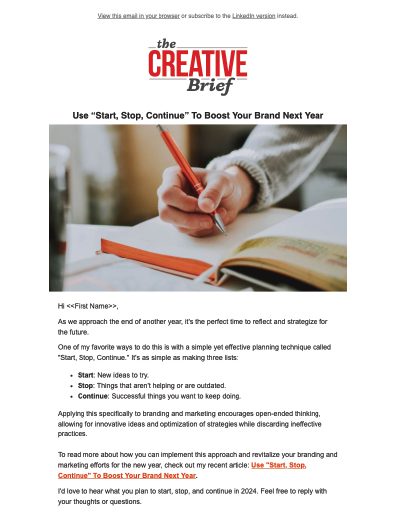By the end of 2015, after being an in-house creative director for nearly 8 years and working in this field for over 20 years, I found myself self-employed for the second time in my career. Now, as I enter my fourth year as a brand and creative strategy consultant, I attribute some of my success as a business owner to my experiences and the lessons I learned by working in-house. Reflecting on that time being in-house, I can also say that my consulting mindset, and teaching instincts, also attributed to my success leading in-house creative teams.
Whichever side of the fence you find yourself on, leading an in-house team or managing your own business, here are some things that have strikingly similar importance to how successful you will be.
Remember, you are running a business.
As much as being a creative leader is about the creative output of your designers, writers, photographers, videographers, and so on, it’s also about understanding how to run a business. As an in-house leader, you must come to grips that you are running a business unit within a corporation that needs to have procedures, processes, and policies to operate smoothly. Some corporations event document this information to ensure continuity of business. Your job, as the business unit leader, is to continually reassess, reevaluate, and redesign how your business runs to make it the most effective it can be.
This operational rigor comes in handy when you are self-employed so that your own business runs smoothly, plans for the future, and adapts to marketing changes. If you take the time to document how you run everything about your business – from marketing to working on projects, and billing clients – you will absolutely be more mindful about how things get done and where you can make adjustments to be more efficient and profitable.
Your relationships with other people are really, really, important.
I have believed in the power of networking since I was a teenager. I got my first freelance job because of it, got my first job out of college because of it, got my first corporate job at Banana Republic because of it, and quickly transitioned to a position at Gap when Banana Republic decided they were no longer going to be doing graphic tees because of it. I built my freelance business from 1999 to 2007 through networking, and my current consulting firm would not have ramped up so quickly since 2015 if not for my network of professionals that I could reach out to during that time.
So many people get the idea of “networking” wrong. If you’re networking, thinking that good things will come of casting a wide net, you are wasting your time. The key to strategic networking isn’t spending MORE time networking, it’s less time – but with more of the right people. There are two things that I have come to believe are more accurate than anything in business:
- It’s not what you know, but who you know
- Building strong relationships is more important than having a big network
Any self-employed creative professional, agency owner or consultant knows the power of networking. It’s how you grow awareness about your business, build a reliable source of referrals, and find strategic partners you can do business with. But for the corporate leader, this is even more so important. You can’t operate in a bubble within the corporate environment. You need to get out there and meet your internal clients, peers, and the (appropriate) higher-ups in the business. Having good relationships with all of these people will make it easier to sell creative ideas, educate them on how your department does things, and frankly make it easier to ask for more resources. Additionally, it’s one of the ways you will build credibility within the company because – if you do it right – your network will be advocates of your department and of you.
Manage your time like it is a precious, rare, commodity. Because it is.
I’ll be blunt here and tell you the one skill you need to master no matter whether you are in-house or on your own: Say “no” to meetings or anything that is not worth your time, as much as possible.
There are two reasons for this, and they should be kind of obvious – but the more I talk to other creative leaders, the more I realize it is not as apparent as I thought it was.
- You have too much work to do to spend so much time in unnecessary meetings.
- Being too available sends the wrong message to everyone.
Creative leaders get invited to a lot of meetings about projects. We also get invited to business meetings related to the company, as befitting our roles in the corporate structure. Those of us who have worked corporate jobs know how many companies have developed a “meeting culture” (I actually attended a meeting where we planned other meetings) that becomes detrimental to both productivity and morale. What’s more, the nature of our role invites people to drop by our offices for an impromptu brainstorming session, status update, or worse to complain about a new corporate policy that will inevitably create more work for everyone. These interruptions not only break your concentration and the flow of creative ideas, but they suck up your time that you will need to earn back by staying late at the office or working over the weekend.
Guess what? Most meetings are unnecessary. Much of what someone called a meeting for could be achieved on a quick phone call or email. And if a meeting is essential, you need to ask yourself: Do I need to be there? Maybe this is an opportunity to delegate a direct report to go to the meeting and report back to you with a brief email.
As a consultant, you need to be discerning about how you spend your time. Not only do you need to leave time to do the work clients hired you to do, but you need to give yourself time for business development, marketing, finance, etc. Yes, networking is vital to growing your business, but you don’t need to do more of it. Be strategic about who you meet with and how. Can it be done with a phone call? Is this networking meeting or event going to result in a referral, business partner, or client? If it’s not a “heck yes,” then it’s a “heck no”!


